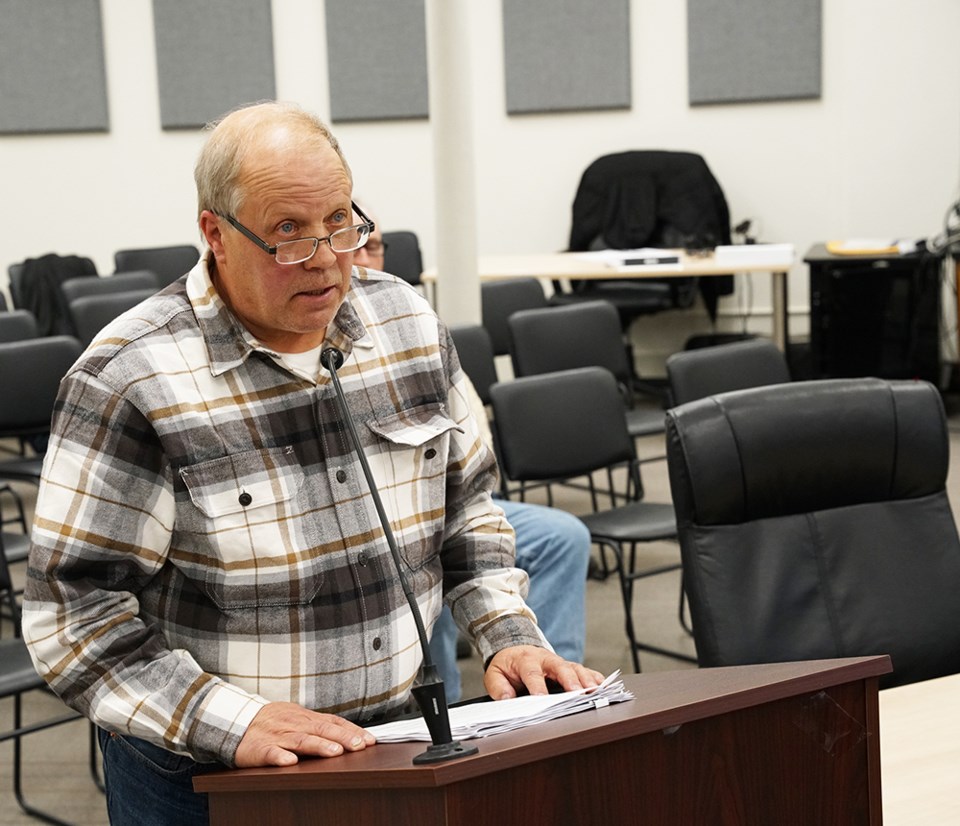A 2.15 hectare (5.31 acre) property on Manson Avenue that the developer wants to rezone from its current A1 designation to CD4 passed second reading and will go to public hearing.
At the City of Powell River council meeting on November 17, councillors considered the zoning bylaw, which, if passed, would rezone the property at 5201 Manson from its small lot rural residential designation to comprehensive development four – residential small lots.
The rezoning application has been stalled due to a desire by the city planning department to have higher housing density on the property than is provided by the CD4 designation.
According to a staff report, Alan Rebane, the proponent, was proposing a density of 5.8 housing units per acre. The report stated that based on findings from value mapping, this density is too low and would be financially unsustainable.
“To ensure financial resiliency objectives are met, it is recommended that new development where rezonings are required should aim to meet a minimum of 15 to 18 units per acre,” the report stated. “To achieve this on your [Rebane’s] property, you will need to consider ground-oriented multifamily development.”
The staff report stated that rather than proceeding to second reading and public hearing, council could direct that prior to any further consideration, the applicant reconsider the proposal and work with staff on the creation of zoning provisions that accommodate a combination of ground-oriented, multifamily and high-density semi-detached residential development on the subject lands.
At the meeting, councillor George Doubt proposed a recommendation that the rezoning application be read a second time and that it proceed to public hearing, with the caveats of demonstrating legal access to Joyce Avenue from the property can be achieved, and that the Rebane provides a voluntary community amenity contribution in the form of donating some of the land, or a cash contribution.
Doubt said there were two options put forward by staff at the November 15 committee of the whole meeting. One was to give second reading, go to public hearing and see after the public hearing if council is going to complete the rezoning, or send it back to the developer and planning department to see if they could agree on a higher level of density than the proposed CD4.
“This [second reading and public hearing] is a better choice and gives an opportunity for the developer to go ahead with the project that has been planned for a long time,” said Doubt. “It increases the density overall in the city, which is an important goal, to make sure we take advantage of the existing footprint of the city and help to reduce the burden on taxpayers of maintaining the infrastructure of the city.”
Doubt said he would be voting in favour of the motion.
Councillor Rob Southcott said there are relatively few opportunities to truly influence the future in a significant way as a council. He said this rezoning is one such opportunity.
“When we are making decisions about housing in the community, we are making decisions that extend 50 to 100 years into the future,” said Southcott. “I expect housing to be built on the subject property to last an equal amount of time, so we have to think in those terms.”
Southcott opposes motion
Southcott said the city has several plans and documents that point very clearly in the direction of the alternative option that councillors considered, which is to renew increased density discussions with the applicant.
“What’s being proposed in CD4 is single-family residential,” said Southcott. “Even though it is more dense, there’s no question in my mind that the community around this proposed development objects to any increase in density.
“We’re not going to have the support of that neighbourhood, but it is within the larger concept of densification in the central part of our community, and that is the vision I have for our future. I urge us to fail this motion.”
Councillor Jim Palm said he believes council has an obligation to move in the direction proposed by the motion.
Councillor Cindy Elliott said council has received all the information it is going to get from staff and Rebane, and now it is time to move along to a public hearing, which is the fair thing to do in an administrative process. She said she is in favour of the motion.
Councillor Trina Isakson said she was initially conflicted over the rezoning and voted at committee of the whole in opposition of bringing it to council. She said it’s fair to the proponent to go forward and let the public have a say. She said she’d support the motion.
Councillor Earl Almeida sided with Southcott. He said while CD4 does increase density, he is concerned about the precedent it sets for the rest of the neighbourhood, which has a number of A1 properties, when they become available for development.
Almeida said he reached out to a couple of mortgage brokers to determine what an average family income in the city could afford, and that figure was about $300,000. He said a CD4 property in the neighbourhood is on the market for $750,000.
“My concern is while we have a housing need, does a CD4 development meet that need for our current residents of the city?” asked Almeida. “I have spoken to someone making six figures of income who said they probably couldn’t afford the house they are in if they had a chance to buy it again. Our housing needs should be focused on who is in the city right now. I’m not sure this development is going to be built towards that.”
Mayor Ron Woznow said he supported the motion.
“If we choose to not proceed to second reading, it would make it extremely more difficult to have other developers come forward and help us solve the housing problem we have today,” said Woznow.
Council passed a motion for second reading and a public hearing, with Southcott and Almeida opposed.



